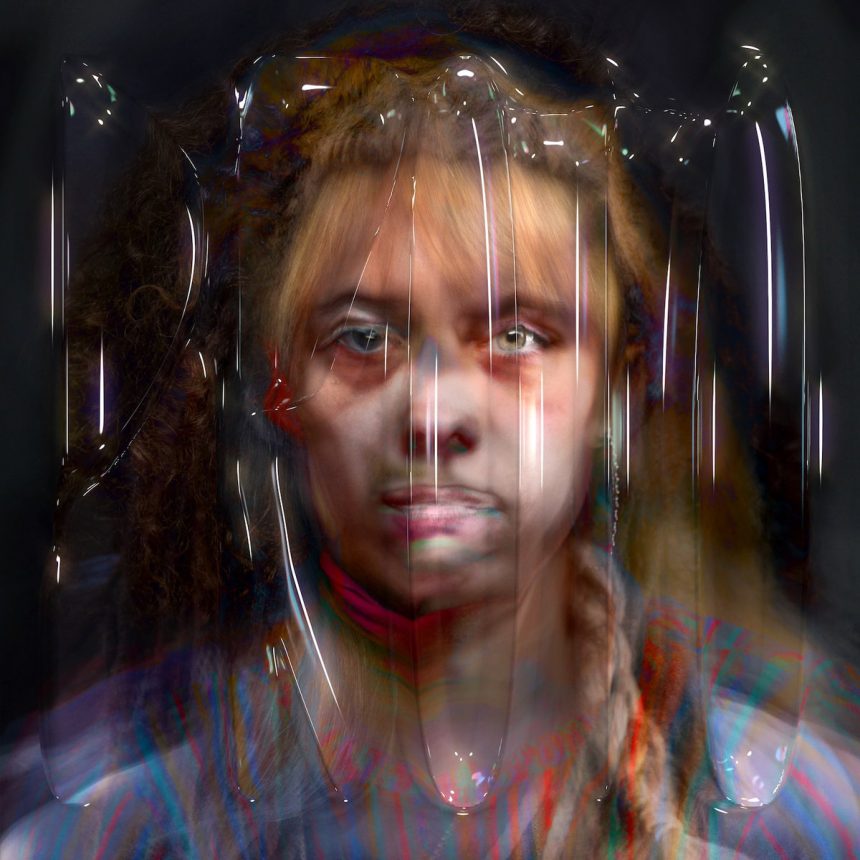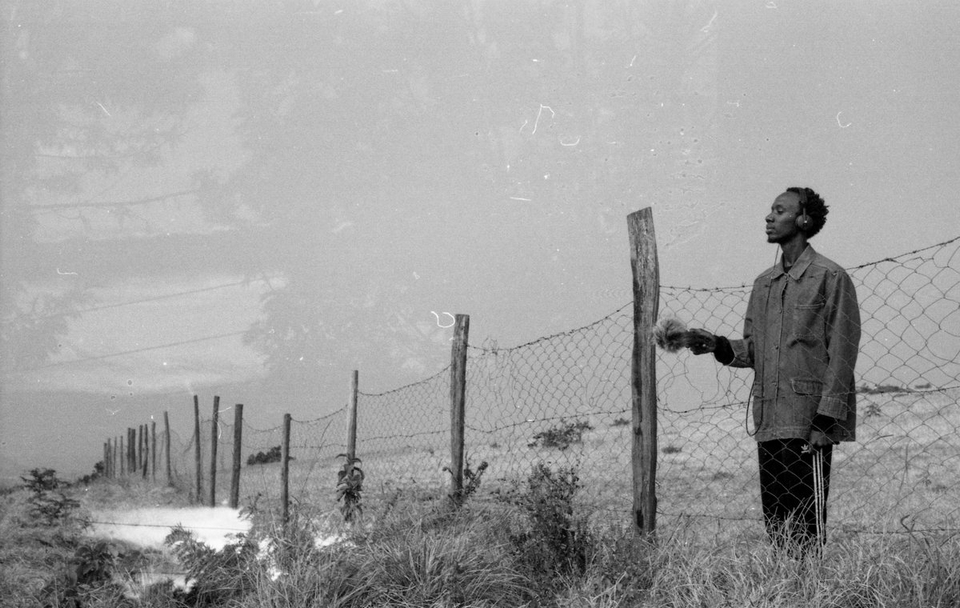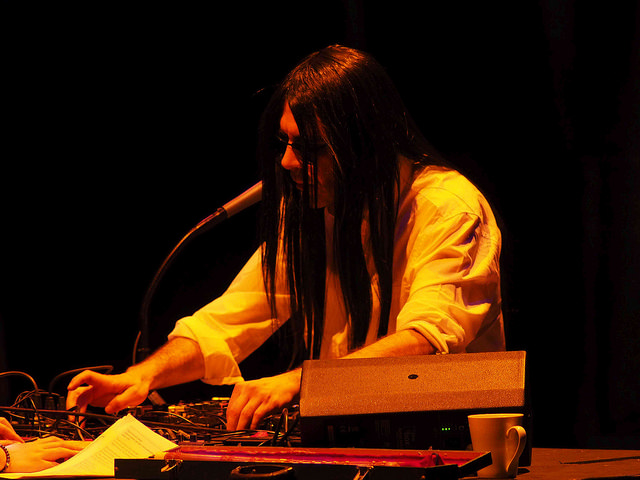Holly Herndon – More-than-human, non-human, inhuman

Holly Herndon “PROTO” (4AD, 2019) – review by Mikkel Rørbo
When it comes to Holly Herndon’s third album, “PROTO”, all anyone wants to talk about, it seems, is artificial intelligence. It’s everywhere at the moment; in my own work as well, which is why I thought I’d find it ever so compelling. But really, to just focus on this one conceptual aspect is to miss the wood for all the trees: there are plenty of other concepts at play on this record. Many of which fit into Herndon’s overarching practice in a way that is far more revealing than focusing on the utilization of machine learning.
“PROTO” arrives four years after Herndon’s previous album, “Platform”, with 13 tracks that are unmistakably Holly Herndon, but definitely with a new voice in more ways than one. Herndon’s signature granularized voices and fragmented beat-driven compositions are still here, but there are pieces on this record that have an ethereal and obscured quality that has never been so pronounced before. This is certainly due to Herndon’s newest voice, called Spawn, which is in fact generated through artificial intelligence (or the less fancy sounding, machine learning), which would be why everyone wants to talk AI.
I’d like to comment a bit on the way that Artificial Intelligence is utilized as a backbone for the “PROTO” concept. This is communicated far more through associated, but musically extraneous, material such as interviews or articles, so it can easily be ignored if the music is all the listener comes for; that just happens to not be the case for myself. In my opinion, it is a missed opportunity for the radical questioning of ‘the human’ and what makes “human” human. Especially when the AI is anthropomorphized and gendered (Spawn has been repeatedly named a ‘she’) in the way that Herndon’s “AI baby” is. The theorist and compatriot of Herndon, Benjamin H. Bratton, has previously said that there is no reason an AI should be an ‘intelligence for us’ nor its intelligence ‘necessarily humanlike’. This does not have to be a dystopian proposition, because therein also lies its speculative possibilities and its call to think beyond intelligence as part of a singular human embodied experience. That is, of course, disregarding the fact that AI as a technology is definitely in a nascent state—therefore the oft-used infant analogy—but that is beside the point, the fundamental way something is named or perceived has huge speculative potential.
When considering AI, or rather machine learning, as more of a tool to do other things is when it becomes far more interesting in the context of “PROTO”. To name some examples: Spawn in this case opens up more-than-human possibilities for sound generation with the voice. Rather than ‘machine vision’, Spawn elucidates a whole field of ‘machine hearing’, which is beyond just ‘listening’ as it generates new interpretations and meaning with all of its black box conundrums. Further, it underlines a non-adversarial relation between human and machine, allowing us to be more human together, as Herndon has pointed out herself. The tool-like nature of machine learning and its development is also the point at which Herndon’s work becomes the most critical of its own technologies, as it looks at the ethical complexities and the importance of ‘care’ in the way it is furthered in the future. These aspects fit in well with the overall ideas of “PROTO” and provides a strong illustration of the technology’s place in the collective and in the process of creation.
This brings me to the next point, which is the role that the collective and the collaborative plays in Holly Herndon’s work. Herndon’s tendency towards interdisciplinary collaboration is definitely a huge part of what makes her stand out in the context of electronic music. Her desire to experiment and work with others beyond just music is a trait that makes her work extremely compelling and challenging. As such, the fact that she would work on a project of this complexity—and it certainly is a feat that is extraordinarily complex, particularly in the context of an album—is perhaps not surprising, but the way in which she goes about it is impressive and seemingly effortless—as completely natural extension of her practice.
For quite some time, “Holly Herndon” has been more than just the singular work of Herndon and has under its umbrella encapsulated the continuous collaboration with people such as the artists Mat Dryhurst and Colin Self, but also a number of others, as was the case on the previous album, “Platform”. This becomes a completely essential point on this new album, wherein the work of a central ensemble, as well as audience participants in documented training sessions, forms the core of the music. On “PROTO”, Herndon continues her ongoing work with the voice as an extended medium for which this ensemble is crucial. The voice has been a foundation for all her albums so far, from the abstractions of “Movement” (2012) to the singsong and ASMR whispers of “Platform” (2015) to the communal singing and investigation of synthetic voices of “PROTO”.
Some of the standout moments of the album are certainly also carried by the expertise of the folks that Herndon worked with; such as the Sacred Harp technique of folk-singing, which was carried by singer Evelyn Saylor, and was crucial in lending those spine-tingling choral flourishes on the track “Frontier”. Not to mention Jules LaPlace, who was instrumental in developing the machine learning algorithms necessary to generate the ensemble’s non-human voice, and who e.g. participated in a talk on AI in music together with Herndon and Dryhurst for last year’s CTM festival in Berlin (and yes, the album has been in the works for than two years and I remember seeing Spawn’s shiny LED-blinking enclosure on Herndon and Dryhurst’s desk that year – it should be a testament to their collective tenacity that they worked so long on such an experimental process).
Musically speaking, beyond the explicated live training on the album, there are perfect, standout moments of pop-bliss that channel this sense of the communal, shared experience, which Herndon has been stating as integral to “PROTO” and its process. This, I feel, is the true strength of Herndon’s work, both recorded and live, the way in which she (and by extension the rest of the entity which “Holly Herndon” has become qua a collaborative platform) has managed to spearhead and expose a multidisciplinary collective of artists, musicians and developers, and give space for each to shine in a cohesive manner. It also brings to the front a fact that many creators already know, but many, particularly in the artistic sphere, are finding difficult to admit: that the lone genius is a myth. Creation is inherently a shared endeavor and never takes place in a vacuum. This is particularly true in a network society; here creation becomes rhizomatic to the extreme, interconnected and interpersonally mediated. This investigation into the shared possibilities in an increasingly mediated, individualized and automated world is extremely relevant and politically potent, which Herndon is, of course, hyperaware of.
As I alluded to earlier, I think this is such a strong conceptual point that connects with Herndon’s practice over the last few years. Collaboration and the investigation of kinship draws parallels to Donna Haraway’s slogan of “Make Kin Not Babies” and ideas of more-than-human, non-human, inhuman entanglements and non-individualizations more than they do the neo-rationalist intelligence theories of Reza Negarestani (although both, I guess, can be claimed to be conceptually relevant). This familiarity is also evident in the text by artist Jenna Sutela, which is read on the track “Extreme Love”, tracing intergalactic kinship and bodily co-habitation. In fact, I can’t think of other artists that are so vehemently dedicated to creating a strong shared community as Herndon and Dryhurst. This is admirable in itself, but the way they manage to encapsulate this in artistic projects and on records is what makes it truly impressive. Perhaps to follow the idea of kinship, Haraway’s abovementioned slogan should be taken at face value; rather than Spawn being a “baby”, Spawn is kin and a continuous, complex assemblage of knowledges, voices, and interpretations.
I was fully expecting to love this new album as I’ve been enamored with Holly Herndon’s previous work as well as her/their messy live shows filled to the brim with life-affirming energy, community spirit and hardware collapses, but I have to admit that I’m still not entirely sure where I sit with this one yet. I have a feeling that in the long run, it will resonate in a way that is deep and useful, since it has already gotten me off on several rants on AI, given me ‘the feels’ when listening to “Frontier” the first time or with the full-on Enya-channeling vibes of “Swim”, but also simply because I’m not sure yet. This is the kind of album that will get you thinking, will get you digging into the details and get you to try and find your own way around its themes, and that’s pretty damn strong.
Info: “Proto” was released on May 10th by 4AD.


